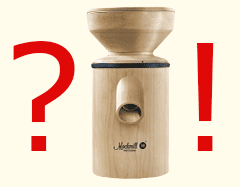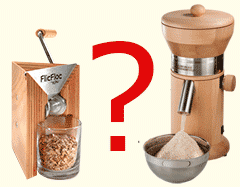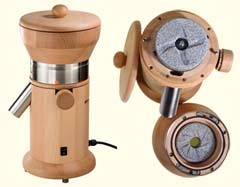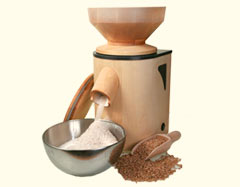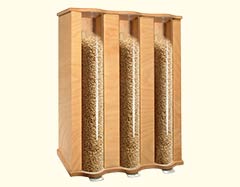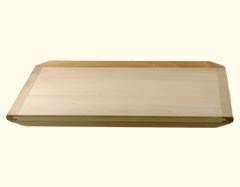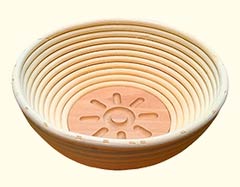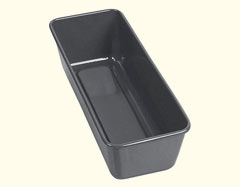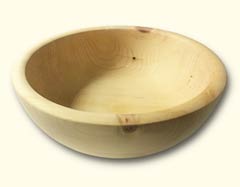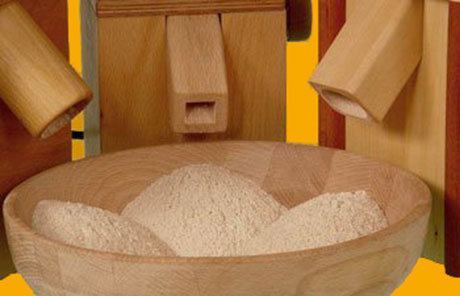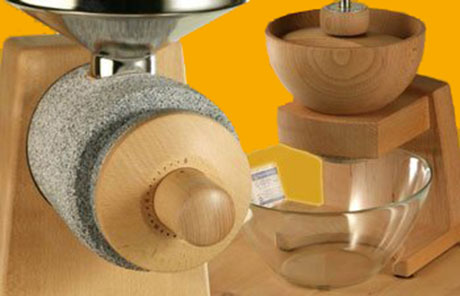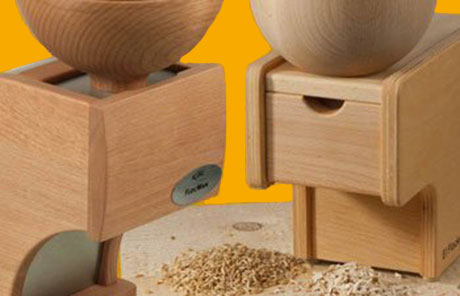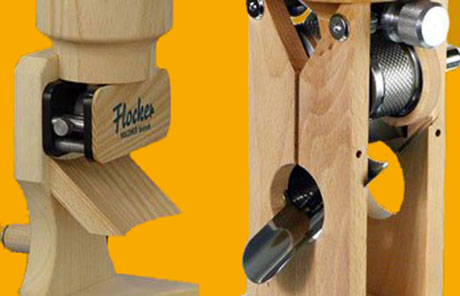Wholemeal flour instead of white flour / extracted flour
It's best to grind and flake your own fresh flakes at home with a grain mill and a flaker.
Wholemeal bread made from the whole, freshly ground grain is wholesome
The bread
Our daily bread since time immemorial
From time immemorial, cereals have been one of the most important staple foods, mostly in the form of bread. Only in the course of industrialisation did the whole, whole grain disappear from bread.
Extractable flour
Tantalisingly fine, but tasteless and worthless
With rat experiments, Prof. Friedrich Proell was able to prove that extract flour causes deficiency symptoms. Rats fed exclusively on white flour products languished and eventually died, while the whole-grain-fed rats enjoyed excellent health.
Whole grain flour
Wholemeal = healthy
Unlike white flour, wholemeal flour can only be kept for a few hours without much loss of quality. In white flour, all the valuable components of the grain in the sense of "whole food" (which are contained in the germ) have been removed. This makes white flour more durable, but it also devalues it in the sense of wholefoods. Those who now want to have wholemeal flour therefore need their own grain mill at home, where they can process the wholemeal flour immediately after milling. As a result of the educational work, more and more manufacturers who built grain mills for the home
were found after Dr. Schnitzer.Wholemeal bread
Wholemeal bread is not necessarily wholemeal bread
Wholemeal bread can be bought everywhere after all! But make no mistake. It doesn't have to be wholemeal bread. What you usually get at the ordinary bakery is often "artificial" wholemeal bread. It then consists of white flour that has been enriched with bran or all kinds of grain mixtures and no longer corresponds to the natural composition of the whole grain. This so-called wholemeal flour is therefore not "whole". Because only the grain processed and consumed as a whole is wholesome in the sense of a wholefood diet. So a bread does not become wholemeal simply by adding bran. However, "wholefood" bread is also available from bakers. However, only from bakers who have their own mill in the house and assure you that they do not use industrial ready-made baking mixtures.
Whole Grain Pioneers
Whole-grain pioneers enlighten
Dr. Schnitzer, a dentist, started an educational campaign for whole-food nutrition alongside Dr. Bruker in the 1960s. Both were able to draw on valuable scientific findings by Prof. Dr. Kollath and fight against the food lobby, especially the sugar industry for health through healthy nutrition.
First household mills
Dr. Schnitzer takes initiative
Dr. Schnitzer: "The fresh grinding of cereals immediately before further use proved to be one of the most important measures for securing health. But there were no household appliances for this. The consequence: 1966 invention and construction of the modern household grain mill with grindstones, and development of industrial production methods to manufacture precise small grindstones from the natural materials magnesite and basalt ..."
Interview
Dr. Schnitzer still an activist for wholefoods today
www.schildverlag.de - Teaser to a 60 minute documentary. In the first volume of Health Teachings, Johann Georg Schnitzer shares his experience and knowledge on the subject of healthy eating. Most importantly, how to get from grain to bread. His book on this at Schildverlag
.Lecture
Dr. Max Otto Bruker - Original lecture "How can I maintain my health"
In a one-and-a-half-hour lecture, Dr. Bruker talks about denatured foods and the diseases that go with them. Whole foods are mainly about consuming food in its wholeness and as untreated and fresh as possible.
Full protein bread
Protein bread is not the same as wholemeal bread
Wolfgang Mock, a millwright with a passion for over 40 years, explains what is important for a protein bread to be wholesome and healthy. It is not enough to simply add isolated protein to food (e.g. bread)
From minute 6 in the video it is explained that it is important to use the whole fruit (here pulses as protein donors) and freshness, which also corresponds to the core message of the "wholefoods": consume food as fresh as possible and in its wholeness!
More about Wolfgang Mock and his grain mills on his homepage www.grainlovers.shop
